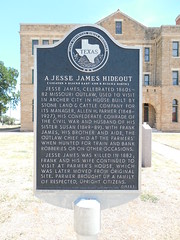Jesse James


Jesse James
(1847-1882)
Family tree
Commemorated on 4 plaques
Jesse and Frank James famous western frontier outlaws, who had many Texas hideouts along a line from the Rio Grande to the Red River. The camps--extending into Missouri, their home state--were used for hiding stolen horses until posses could be thrown off the trail. The campsites were sometimes known to be scattered settlers, who feared or befriended the bandits. Also friendly with the James Brothers (and also operating sometimes in Texas) were fellow Missouri outlaws, Cole Younger and “Bandit Queen” Belle Starr. This was an era of widespread lawlessness in Texas. Billy the Kid roamed into West Texas. The Daltons, John Wesley Hardin, Cullen Baker, Bill Longley, Sam Bass, and many others found it easy to kill and rob and then hide in wild areas where they were beyond the reach of local officers, and food was plentiful. After Reconstruction ended in 1874, Texas Rangers were reorganized to restore respect for the law. Given special powers, in 1889-90 they arrested 579 wanted men (including 76 alleged murderers). Jesse James and some other notorious badmen by then were dead. Frank, reformed, worked as a salesman in Dallas, Paris, and other Texas towns.
U.S. Route 380 & Decatur County Road 2311, Decatur, TX, United States where they was
Texas Historical Marker #00044
A Jesse James Hideout. Jesse James, celebrated 1860s-1882 Missouri outlaw, used to visit in Archer City in house built by Stone Land and Cattle Company for its manager, Allen H. Parmer (1848-1927), his Confederate comrade of the Civil War and husband of his sister Susan (1849-89). With Frank James, his brother and aide, the outlaw chief hid at the Parmers' when hunted for train and bank robberies or on other occasions. Jesse James was killed in 1882; Frank and his wife continued to visit at Parmer's house, which was later moved from original site. Parmer brought up a family of respected, upright citizens. Erected by Archer County Historical Survey Committee. House is shown only by appointment, 1972. #44
?, Archer City, TX, United States where they hid
Texas Historical Marker #03700
Old Campsite of Jesse and Frank James. Famous western frontier outlaws, who had many Texas hideouts along a line from the Rio Grande to the Red River. The camps - extending into Missouri, their home state - were used for hiding stolen horses until posses could be thrown off the trail. The campsites were sometimes known to scattered settlers, who feared or befriended the bandits. Also, friendly with the James brothers (and also operating sometimes in Texas) were fellow Missouri outlaws, Cole Younger and "Bandit Queen" Belle Starr. This was an era of widespread lawlessness in Texas. Billy the Kid roamed into West Texas. The Daltons, John Wesley Hardin, Cullen Baker, Bill Longley, Sam Bass and many others found it easy to kill and rob and then hid in wild areas where they were beyond the reach of local officers, and food was plentiful. After reconstruction ended in 1874, Texas Rangers were reorganized, to restore respect for the law. Given special powers, in 1889-90 they arrested 579 wanted men (including 76 alleged murders). Jesse James and some other notorious badmen by then were dead. Frank, reformed, worked as a salesman in Dallas, Paris, and other Texas towns. #3700
US 380, E of Decatur, Decatur, TX, United States where they stayed
Texas Historical Marker #09475
De Kalb. Named for Maj. Gen. Johann de Kalb - a hero of the American Revolution - upon suggestion (1836) of David Crockett, a visitor on his way to fight in Texas War for Independence. Other Texas heroes traveling through here were James B. Fannin and Wm. B. Travis. Settled by 1831, when land was given for a public school by Dr. W. H. Boyce, Wm. L. Browning, D. M. Chisholm, Clement R. Johns and Judge (and Dr.) James W. Smith. Site of first college in Bowie County, founded in 1839 and of Ninth Masonic Lodge in Texas, organized 1840. Served as county seat, 1840-1841. On two early stagelines. A stopover for U.S. immigrants to Texas Republic, and 49'ers on way to California gold rush. In 1870's hideouts of train robbers Sam Bass, Jesse James, other notorious characters were nearby. Texas & Pacific Railroad reached here 1876. Site in 1889 of P. S. Ramseur's sawmill which shipped high quality lumber all over United States; to get logs to mill, he built a railroad, traces of which still exist. Although in 1896 and 1923 most of businesses were destroyed by fires, city prospers today. Center of ranching, truck farming, and pulpwood productions. Known as "The Pride of East Texas". (1966) #9475
?, De Kalb, TX, United States where they was near




